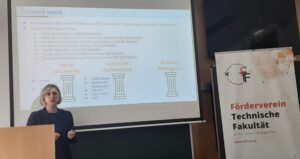TEWI Colloquium
Assoc. Prof. Amila Akagic | Faculty of Electrical Engineering | University of Sarajevo
Tuesday, August 26, 2025 at 02:00 p.m. @ S.1.42 | University of Klagenfurt
Abstract: Artificial Intelligence is now an omnipresent term across many, if not all, disciplines. Many stakeholders are motivated to adopt it in order to stay competitive. Interdisciplinary research is particularly affected, as researchers and practitioners come together to explore how AI can be applied effectively to diverse problems. Many companies have already collected vast amounts of data that they do not yet know how to use. This presentation provides an overview of selected projects that illustrate applications in biomedical imaging, plant phenotyping, materials informatics, natural language processing, and accelerated hardware. The aim is to demonstrate how advanced AI, machine learning, and high-performance computing can bridge the gap between scientific discovery and real-world impact.
 Bio: Prof. Dr. Amila Akagic is currently an Associate Professor in the Department of Computer Science and Informatics at the University of Sarajevo. Her primary areas of interest are Artificial Intelligence, Machine Learning, Deep Learning, Computer Vision, Image Processing, and Digital Signal Processing.
Bio: Prof. Dr. Amila Akagic is currently an Associate Professor in the Department of Computer Science and Informatics at the University of Sarajevo. Her primary areas of interest are Artificial Intelligence, Machine Learning, Deep Learning, Computer Vision, Image Processing, and Digital Signal Processing.
Dr. Akagic earned her Bachelor’s and Master’s degrees in Electrical Engineering with a focus on Computer Science and Informatics from the University of Sarajevo in 2006 and 2009, respectively. During the 2007/2008 academic year, she was honored with a Fulbright Visiting Student Award, which led her to become a Junior Researcher at the Embedded Systems and Architectures Lab at the University of California, Riverside.
In 2010, she extended her academic journey by spending a month as a visiting academic at the Faculty of Electrical Engineering, the University of Ljubljana. Her quest for knowledge then took her to Tokyo, Japan, in 2010, where she was granted a MEXT scholarship. She successfully completed her Ph.D. at Keio University in 2013 in the Amano Lab.
Her previous research primarily revolved around devising innovative strategies for accelerating the computationally intensive segments of algorithms by transferring them to an FPGA. The key challenge in this research lies in leveraging architectural insights to tailor the algorithm to the specific hardware, rather than the reverse approach.
During her Ph.D. studies, her focus was on crafting architectures and methodologies aimed at significantly reducing the execution time of Cyclic Redundancy Check algorithms, particularly when implemented on FPGAs, and in the realm of iSCSI protocol implementation. She also nurtures a keen interest in expanding her expertise in various domains, including Computer Architecture, with a particular emphasis on Reconfigurable Architectures, High-Performance Computing, and Heterogeneous Computing.
Beyond her academic pursuits, she finds solace in the great outdoors, with a particular fondness for mountain hiking, skiing, and scuba diving. Her diverse range of hobbies encompasses pondering future trends, immersing herself in the realms of history, philosophy, and psychology through literature, creative writing, yoga, jazz ballet, and photography.

